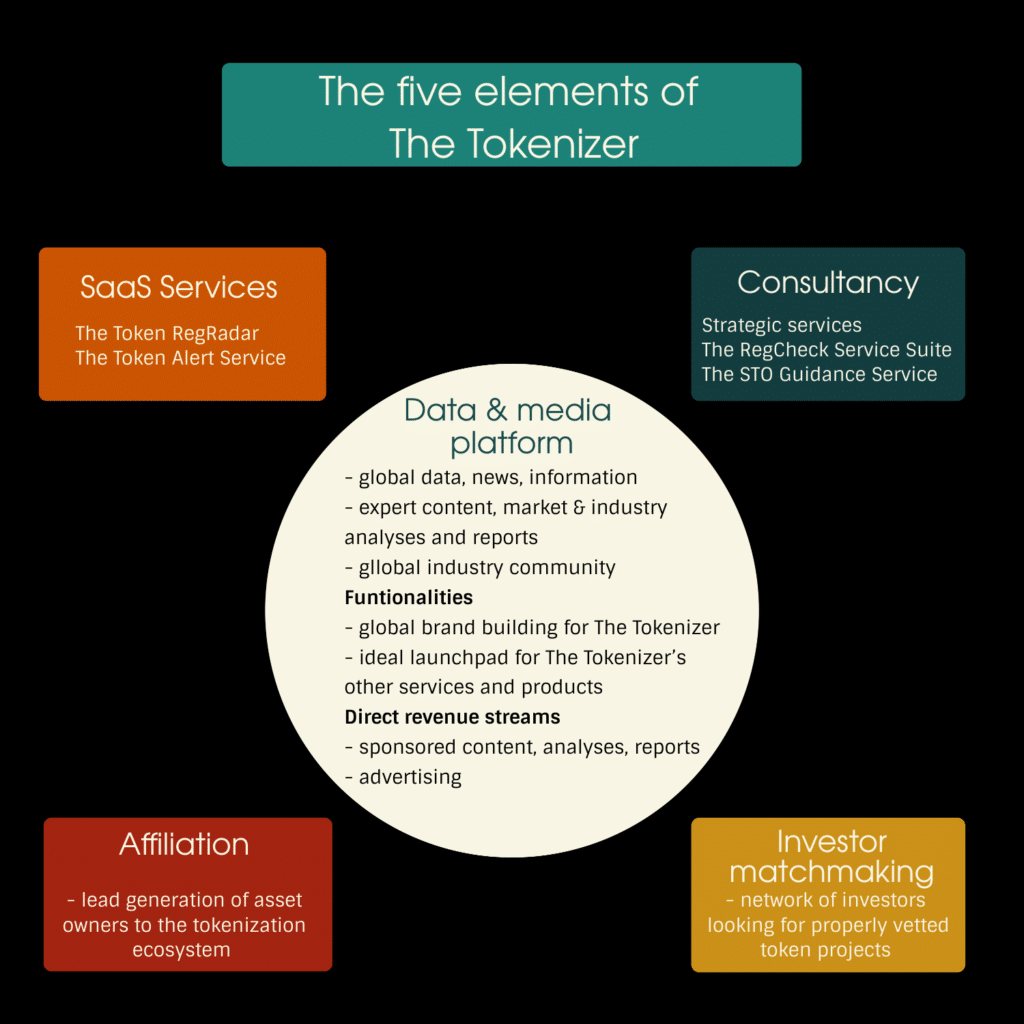The Tokenizer A/S
- a global platform to accelerate the growth of the asset tokenization industry

“Tokenization of global illiquid assets estimated to be a $16 Trillion business opportunity by 2030
[…] Tokenization potential of $68 trillion by 2030 in best-case scenario.”
Boston Consulting Group
The Tokenizer currently offers four services
The Token RegRadar

The Token RegRadar keeps track of all regulatory changes globally within the expanding space of asset tokenization and security tokens.
The RegCheck Service Suite

The RegCheck Service Suite helps projects, platforms, and companies issuing tokens understand the legal implications and comply with current legislation in relevant jurisdictions.
The STO Guidance Service

The STO Guidance Service provides customised guidelines and a complete roadmap of all the steps of an STO.
The Tokenizer Media

The Tokenizer Media is the world’s leading news and information platform for the asset tokenization industry. The media platform currently has more than 7,000 unique daily visitors.
Short video presentations of
The Token RegRadar and
The Tokenizer A/S
"The next generation for markets, the next generation for securities,
will be tokenization of securities."
CEO Larry Fink, BlackRock
Coming services and projects
The Tokenizer expects to launch at least three new services and projects during 2024:
- AI integration layer for The Token RegRadar and coming services.
- The Token Alert Service – This Service will monitor and collect data about asset tokenization transactions from a wide range of sources in the primary and secondary markets globally. The subscribers get an overview of all activities related to any security token they might consider investing in or already own. The service will monitor security tokens across categories to spot trends and tendencies in different geographies.
- The Investor Matchmaking Service – This service will offer a number of features for both professional and retail investors who want to utilize investment opportunities in properly vetted token projects.
The five elements of The Tokenizer
All current and future services from The Tokenizer belong to one of The Tokenizer’s five core categories as described in the model to the right on this page.

Why tokenize companies?
In principle, any asset can be tokenized – equity, debt, collectibles, music, art, real estate and all kinds of real-world assets
One asset class with a massive potential is private, non-listed companies. But why would you chose to tokenizer your company?
First, tokenization is a proces of representing assets in the form of pieces of computer codes called tokens. In principle, all kinds of assets can be tokenized.
Tokenizing a company typically means representing the rights of the shares of the company in the form of regulated security tokens.
These security tokens are controlled by so-called smart contracts, recorded on a blockchain, and tradeable via exchanges or peer to peer between investors.

What are the advantages?
- Tokenization increases the liquidity of shares in unlisted companies.
- Tokenizing your company enables you to raise new capital through a Security Token Offering – or STO. This is a fully regulated, but much more accessible alternative to an IPO.
- Tokens representing company shares can be traded 24/7 and potentially worldwide.
- Smart contracts ensures compliance, and the blockchain keep track of all transactions and makes it easy to update your captable.
Why tokenize funds?
Investment funds such as:
- Venture Capital Funds
- Private Equity Funds
- Commodity Funds
- Real Estate Investment Trusts (REITs)
- Funds of Funds
- Exchange-Traded Funds (ETFs)
- Hedge funds
are all possible candidates for tokenization.
Tokenizing funds is already possible today, and to a large extent, this resembles the process of any other security token offering.
According to the latest accessible numbers, there are 14,089 Private Equity funds, Hedge Funds & Investment Vehicles businesses in the US alone as of 2023, which is an increase of 2.4% from 2022.
What are the advantages?
- Increased liquidity
Tokenization increases liquidity because shares in the tokenized fund are represented by regulated security tokens (which are pieces of computer codes on a blockchain managed by smart contracts) that can be traded 24/7 on any security token exchange in the world – or even peer-to-peer between digital wallets.
- Broader range of investors
Investing in traditional funds is typically reserved for ver wealthy investors due to large investment tickets. Tokenization allows for easy fractionalisation of asset units and ticket sizes, enabling a much broader range of investors.
- Easier management/administration
The use of smart contracts on a blockchain enables transparent real-time traction of all transitions and an always updated cap table. Costly constant reconciliation between involved parties is no longer needed because all transactions are recorded and distributed on a blockchain.
- Automated compliance
KYC and AML checks can be coded into the smart contracts removing the need for manually checking whenever a transaction is made. Also, smart contracts can ensure that only compliant investors can participate in the investment fund.

Why choose a service from The Tokenizer?
The Tokenizer has been around since the beginning of the asset tokenization industry.
The Tokenizer’s team possesses specialized knowledge in asset tokenization and has many years of consultant experience.
The Tokenizer has developed The Token RegRadar, which always provides our clients with updated regulatory insights relevant to their projects.
The Tokenizer has a massive network of professional players in the industry.

THE TEAM

© Copyright 2023 | The Tokenizer A/S


